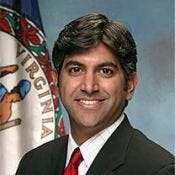Federal CTO Chopra Completes Obama's Tech TriadFederal CTO Chopra Completes Obama's Tech Triad
Three of the nation's tech leaders must work together to implement change and overcome hurdles.


Aneesh Chopra
Federal CTO
President Obama drew immediate praise for selecting Aneesh Chopra to take on the brand-new role of federal CTO, but Chopra is just one of the people who will lead the federal push to improve the use of technology both within the government and throughout the nation.
Chopra, Virginia's secretary of technology, will work closely with federal CIO Vivek Kundra, and the nation's first chief performance officer. Obama nominated Jeffrey Zients for the role of chief performance officer and deputy director of the Office of Management and Budget. Zients brings vast experience in metrics and measurements.
If Zients is confirmed, Kundra will likely report directly to him. Chopra, on the other hand, is expected to report to John Holdren, Obama's Office of Science and Technology Policy director, and directly to Obama.
"There are different lines of authority here, but there are intersecting points between the two," David McClure, VP of Gartner Research government team, said during an interview Monday.
Obama announced his choice of Zients and Chopra during his weekly radio address Saturday. Obama said Zients will "streamline processes, cut costs, and find best practices throughout the government." He also said Zients, founder of D.C. investment firm Portfolio Logic, would likely help as the White House eliminates "dozens of government programs shown to be wasteful or ineffective," Obama said.
"Aneesh and Jeffrey will work closely with our chief information officer, Vivek Kundra, who is responsible for setting technology policy across the government and using technology to improve security, ensure transparency, and lower costs," Obama said. "The goal is to give all Americans a voice in their government and ensure that they know exactly how we’re spending their money -- and can hold us accountable for the results."
Kundra's role is inward facing and operational. His main priorities in the Office of Management and Budget are to manage the $71 billion that the federal government spends on technology each year, to oversee improvement of the federal government's IT systems, and to promote government openness and accountability.
Chopra, on the other hand, will have a more public mission: to promote innovation, oversee the health IT initiative, and put technology to work for the nation's benefit. It's a step up from his position in Virginia, but the role is similar: to promote innovation and foster technology-related economic development.
"In general, CIOs in government are focused more on addressing the immediate business needs of major programs and mission areas, while the CTO is much more technology-focused," McClure said. "As a result, CIOs focus on inward-facing and more-immediate technology needs, while CTOs are focused on external-facing technology capabilities with citizens and businesses." Chopra's Background

Aneesh Chopra
Federal CTO
Chopra's background as a governor's Cabinet member, an adviser to a think tank advising hospitals, and a member of Virginia's task force on e-health records positions him well to deal with the labyrinth of government bureaucracy and the larger goals the administration has set forth, McClure said. Chopra has received high praise for his promotion of economic development through broadband expansion in Virginia.
Intel's Craig Barrett issued a statement saying Chopra has demonstrated outstanding leadership. The National Association of State Chief Information Officers ranked Virginia No. 1 in technology management in 2008. And Chopra has worked with Kundra on Obama's transition team.
McClure said both men are experienced, aggressive, and focused on the Obama agenda.
The success of the White House technology initiatives is likely to hinge on relationships between the two men and their relationships with the chief performance officer.
Chopra will likely set the tone for technology policy, as well as research and development supported by the Office of Science and Technology Policy, while Kundra will oversee internal improvements in interoperability and Zients will likely be in charge of making sure both of their efforts are effective. Chopra's leadership on technology policy is likely to influence spending, while Kundra will streamline spending and Zients will make sure their efforts achieve results.
"They are inherently tied to each other," McClure said. "How that evolves is something everyone will have their eyes on."
Since Chopra's position is new, it's unclear just how the administration will work that out.
Robert Otto, who heads the Advisory Services division at Agilex Technologies, said the three men form a potentially great triad but they are likely to face serious challenges.
"If we can get them all together here, they're going to form a great team," Otto said. "The thing that worries me is what they are going to do about all of the legacy stuff that consumes about 85% of all costs of federal organizations."
Otto spent 27 of his 38 years of federal service at the U.S. Postal Service, where he served as both CIO and CTO. He reduced overall annual IT spending by more than $100 million.
He said that someone will need to make sure that the legacy systems continue to work, and the federal government should bring in outsiders for a 90-day check-up of the federal government's technology spending and to suggest cuts.
While Obama's tech triad works to implement radical change, federal CIOs will have to cooperate to keep all systems running, and many of those changes could prompt federal CIOs to leave, he said.
information Analytics has published an independent analysis on government IT priorities. Download the report here (registration required).
About the Author
You May Also Like




